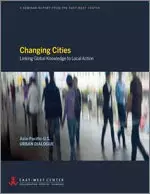Error message

Across the world a massive demographic shift is underway. For the first time in human history, more people now live in cities than in rural areas. In the next 20 years, the world's population will grow from 7 billion to more than 8 billion people. The urban population will grow even faster, from 3.5 billion to 5 billion. Complex demographic and economic trends are propelling people into this new urbanized world, where hundreds of cities will be built and expanded to accommodate migration and growth—particularly in Asia. The rapid transformation of cities and towns into massive urban megaregions has created unprecedented political, economic, socio-cultural, ecological, and physical changes. National and local governments, the private sector, and civil society are facing a sense of urgency as they work to adapt, innovate, and prepare to accommodate the future billions in sustainable, efficient, and inclusive cities that can foster productivity and continued economic growth. Their achievements will largely define the 21st century. The East-West Center's Asia-Pacific-U.S. Urban Dialogue examines the complex human costs of urbanization and innovative solutions for creating more liveable cities of the future. Since 2008, the program has been bringing together small, diverse groups of city leaders, policymakers, urban planners, civil society and business leaders, experts and scholars, from across Asia and the United States to share their ideas, experiences, and strategic visions. Through informal, roundtable discussions that encourage lively and frank peer-to-peer exchanges, participants come away with a deeper and common understanding of the urban challenges faced across Asia and in the West and ways to manage the urban transition. |
Across the world a massive demographic shift is underway. For the first time in human history, more people now live in cities than in rural areas. In the next 20 years, the world's population will grow from 7 billion to more than 8 billion people. The urban population will grow even faster, from 3.5 billion to 5 billion. Complex demographic and economic trends are propelling people into this new urbanized world, where hundreds of cities will be built and expanded to accommodate migration and growth—particularly in Asia. The rapid transformation of cities and towns into massive urban megaregions has created unprecedented political, economic, socio-cultural, ecological, and physical changes. National and local governments, the private sector, and civil society are facing a sense of urgency as they work to adapt, innovate, and prepare to accommodate the future billions in sustainable, efficient, and inclusive cities that can foster productivity and continued economic growth. Their achievements will largely define the 21st century. The East-West Center's Asia-Pacific-U.S. Urban Dialogue examines the complex human costs of urbanization and innovative solutions for creating more liveable cities of the future. Since 2008, the program has been bringing together small, diverse groups of city leaders, policymakers, urban planners, civil society and business leaders, experts and scholars, from across Asia and the United States to share their ideas, experiences, and strategic visions. Through informal, roundtable discussions that encourage lively and frank peer-to-peer exchanges, participants come away with a deeper and common understanding of the urban challenges faced across Asia and in the West and ways to manage the urban transition. |




